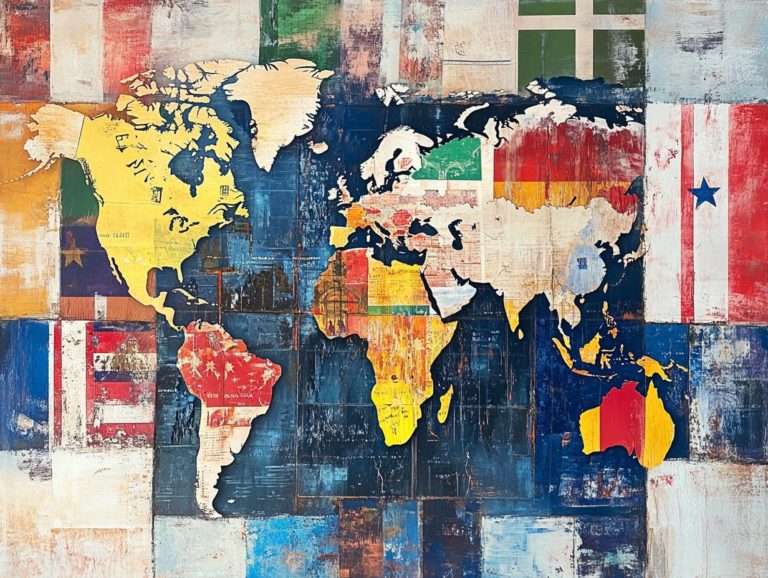International Copyright Treaties Explained
Copyright protection crosses borders, serving as a safeguard for the creative works that shape cultures and societies.
International copyright treaties are essential for establishing a framework for this protection. They ensure that authors, artists, and creators receive the recognition and compensation they deserve globally.
This exploration delves into the key treaties influencing international copyright law. We will examine how they operate, their benefits, and the ongoing controversies surrounding them.
We will also look ahead at potential changes poised to redefine the copyright landscape in our interconnected world.
Are you ready to explore how these agreements affect your rights as a creator? Join us as we unpack these essential agreements and their profound impact on creativity and innovation.
Contents
- Key Takeaways:
- Overview of International Copyright Treaties
- Essential International Copyright Treaties You Should Know
- How International Copyright Treaties Work
- Benefits of International Copyright Treaties
- Criticism and Controversies Surrounding International Copyright Treaties
- Future of International Copyright Treaties
- Frequently Asked Questions
- What are some of the major international copyright treaties?
- Are all countries part of international copyright treaties?
- What happens if a country violates an international copyright treaty?
Key Takeaways:

- International copyright treaties protect intellectual property globally.
- Key treaties include the Berne Convention, Universal Copyright Convention, and WIPO Copyright Treaty.
- Benefits include the protection of intellectual property and global standardization.
- Criticisms include potential limitations on fair use and effects on developing countries.
Overview of International Copyright Treaties
International copyright treaties are essential for protecting creative works across borders. They ensure that you, as an artist, writer, or creator, can benefit from your intellectual property, no matter where you are, especially through frameworks like understanding the Berne Convention for copyright.
These treaties create frameworks for automatic protection. This enables you to safeguard your creations without the hassle of formal registration in every country and promotes global collaboration and innovation.
Important agreements like the Berne Convention, Universal Copyright Convention, and Buenos Aires Convention outline the principles of copyright law. These include moral rights and National Treatment, enhancing the security and longevity of your creative endeavors worldwide.
What are International Copyright Treaties?
International copyright treaties are legal agreements between countries designed to safeguard your rights as a creator over your intellectual property and creative works on a global scale. To delve deeper, consider exploring understanding copyright in international contexts.
These treaties play a vital role by establishing standardized rules that nations can adopt. This ensures that your rights are protected no matter where your works are utilized.
With such frameworks in place, artists, writers, and inventors like you can confidently share innovations across borders, free from the fear of unauthorized use or exploitation.
These agreements also foster collaboration among countries, allowing you to engage in international trade and cultural exchange while protecting your interests.
In doing so, they cultivate a more vibrant global creative economy, ultimately benefiting both you as a creator and your audience.
Essential International Copyright Treaties You Should Know
Key international copyright treaties serve as foundational pillars in the protection of intellectual property. They establish essential benchmarks for safeguarding creative works across borders while ensuring that you, as a creator, receive the recognition and compensation you rightfully deserve.
Among these treaties, the Berne Convention, Universal Copyright Convention, WIPO Copyright Treaty, and TRIPS agreement play pivotal roles in shaping the legal landscape of copyright protection globally.
These agreements tackle various aspects, such as the duration of protection, moral rights, and the significance of fair use. They foster a balanced approach to intellectual property rights in our increasingly interconnected world.
Berne Convention for the Protection of Literary and Artistic Works
The Berne Convention for the Protection of Literary and Artistic Works is designed to automatically protect your creative endeavors. This means you, as a creator, have the power to receive recognition and rights over your literary and artistic output.
Established in 1886, this convention marked a pivotal shift in copyright law. It laid the groundwork for a framework that enshrines both economic rights and moral rights. Moral rights mean you have the right to be recognized as the creator of your work. By emphasizing automatic protection, the Berne Convention removes the need for formal registration, fostering a fair environment for creators across its member nations.
Its foundational principles have shaped copyright laws globally. Your rights should extend for at least 50 years after your death. This provision incentivizes innovation and protects your artistic integrity.
Through its comprehensive framework, the convention safeguards your interests, ensuring your voice and vision resonate in an increasingly globalized marketplace.
Universal Copyright Convention
The Universal Copyright Convention (UCC) is an international treaty that enhances copyright protection for your creative works. It offers a strong framework for intellectual property rights that complements the Berne Convention.
By fostering cooperation among member countries, the UCC enables you to protect your rights as an author while promoting the circulation of your artistic and literary creations across borders.
Its main goal is to ensure you maintain control over how your works are used and receive fair compensation. This encourages innovation and cultural exchange on a global scale.
The UCC establishes key principles regarding the duration and scope of copyright protection. It seamlessly interacts with other copyright treaties, such as the Berne Convention, creating a cohesive system that supports both economic and moral rights of creators worldwide.
World Intellectual Property Organization Copyright Treaty

The WIPO Copyright Treaty (WCT) is an essential agreement that addresses the complexities of copyright law in today’s digital landscape. It ensures you, as a creator, retain full rights over your works in an increasingly online world.
This treaty lays down vital provisions that strengthen copyright enforcement mechanisms, especially as technology evolves. By adapting copyright protections to digital platforms, it creates an environment where you can thrive without the worry of unauthorized use of your intellectual property.
The WCT works in harmony with existing treaties, addressing gaps that traditional laws often miss, particularly regarding digital distribution and online content. It significantly enhances your rights as a creator, ensuring your contributions are protected against infringement.
How International Copyright Treaties Work
International copyright treaties function within a framework of cooperation and compliance among member states. This structure ensures that creators’ rights are upheld and enforced consistently across various jurisdictions.
By adhering to these treaties, you contribute to a global system that values and protects intellectual property, fostering an environment where creativity can thrive without borders.
Act now to protect your work! Learn more about how these treaties can safeguard your creations and seek help to ensure your rights are upheld.
Enforcement and Compliance
Enforcement and compliance with international copyright treaties are crucial for protecting your intellectual property rights. They enable you to seek effective recourse against infringement on your works across borders. However, the complexities of international law present significant challenges.
Legal questions about which country’s laws apply can complicate your pursuit of legal remedies. Different legal standards can also create confusion and uneven enforcement. Some countries may not fully align with international treaties, making it even trickier for you.
To tackle these challenges head-on, consider implementing the following best practices for compliance:
- Establish clear internal policies for copyright protection.
- Foster cooperation among nations.
- Ensure that national governments actively participate in implementing treaty obligations.
By taking a collaborative approach, you can help synchronize efforts to safeguard intellectual property rights on a global scale.
Benefits of International Copyright Treaties
International copyright treaties present a wealth of advantages for you. They safeguard your intellectual property and foster global standardization in copyright law.
This framework creates a secure environment, allowing you to confidently share and monetize your creative works.
Protection of Intellectual Property
International copyright treaties protect your intellectual property by allowing you to safeguard your creative works from unauthorized use and exploitation.
These treaties provide automatic protection, meaning that the moment you create a work, copyright is granted without any need for registration. Moral rights, which protect the personal and reputational value of a creative work, enable you to maintain the integrity of your work and control how it s used. This ensures you receive the recognition you deserve.
Take, for example, the Berne Convention, one of the oldest copyright treaties. It illustrates how these mechanisms function beautifully. Consider the case of a French composer whose musical work was used in an advertisement without consent. He successfully invoked his moral rights under this treaty, resulting in a landmark ruling that reinforced the necessity of respecting artists rights on a global scale.
Global Standardization
Global standardization in copyright law stands out as a key advantage of international copyright treaties. It creates a consistent legal framework across various jurisdictions and ensures fairness in the treatment of creative works.
This framework enables you, as a creator, to protect your intellectual property more effectively, minimizing the risks of infringement that often arise when navigating different national laws.
As a consumer, you also benefit from this standardization, gaining access to a richer array of creative expressions that enhance our diverse cultural landscape.
However, the harmonization of copyright laws isn’t without its challenges. You must consider the delicate balance between safeguarding creators’ rights and ensuring public access, while addressing the differing interpretations of copyright principles.
Ultimately, while international agreements strive to unify copyright regulations, achieving that ideal balance is an ongoing journey. It necessitates cooperation and dialogue among nations.
Criticism and Controversies Surrounding International Copyright Treaties

Despite the advantages they offer, international copyright treaties have encountered significant criticism and controversy.
Key concerns revolve around fair use and access to information, as well as the implications these treaties have for developing countries.
In conclusion, international copyright treaties are vital in today s globalized world. They not only protect your creative works but also promote collaboration and consistency in copyright law across borders.
Fair Use and Access to Information
The concept of fair use within copyright law balances creators’ rights and public access to information.
It’s important to understand that its interpretation can vary significantly depending on the jurisdiction, affecting how different countries apply international copyright treaties. In the United States, for example, fair use permits limited use of copyrighted material without permission for specific purposes such as criticism, commentary, news reporting, teaching, or research.
In contrast, many European countries are more restrictive, prioritizing the protection of authors rights, often at the expense of broader access to information. This divergence has important implications for educators, researchers, and the public, especially in our rapidly sharing digital landscape.
Notable cases, such as the infamous ‘Google Books’ controversy, underscore these tensions, illustrating how fair use can ignite legal debates on a global stage.
Impact on Developing Countries
The impact of international copyright treaties on developing countries raises significant concerns about the balance between protecting creative ideas and works and nurturing local creativity and innovation.
Many of these nations encounter obstacles in accessing vital knowledge and resources for cultural and educational development. Stringent enforcement of international norms can stifle local content creation, making it challenging for indigenous artists and innovators to flourish.
There’s a legitimate risk of too much protection, where rights granted to foreign entities may hinder local industries or impose prohibitively high licensing fees for emerging creators.
To navigate these complexities, developing countries often strive to adapt their national laws, fostering a more equitable framework that safeguards their cultural heritage while engaging with the global marketplace.
Future of International Copyright Treaties
The future of international copyright treaties is on the brink of transformation, shaped by swift technological advancements and shifting global perspectives on creative works.
Potential Changes and Developments
Potential changes in copyright law are essential for navigating the complexities of adapting international treaties to the realities of the digital age, where traditional models of copyright protection may need reevaluation.
As digital platforms increasingly dominate the distribution of creative works, the operation of these treaties requires a fundamental shift. Instead of solely relying on established frameworks, we must explore innovative solutions to tackle the unique challenges posed by the internet, such as the unprecedented ease of copying and sharing.
This evolving landscape complicates enforcement efforts and raises vital questions about the rights of creators in an era where their work can be effortlessly replicated across borders.
By actively participating in discussions about flexible legal frameworks, we can help policymakers harness technological opportunities while ensuring that artists’ rights are upheld in a fair and accessible manner.
Frequently Asked Questions
What are international copyright treaties?

International copyright treaties protect creators’ rights across countries by setting rules for how their works can be used.
Why are international copyright treaties important?
International copyright treaties are crucial because they help creators protect their rights in multiple countries, simplifying enforcement across various laws and regulations.
How do international copyright treaties work?
International copyright treaties establish minimum standards and guidelines for copyright protection in member countries. These standards include the duration of copyright, the rights of creators, and exceptions for certain uses of copyrighted material. Member countries must abide by these standards to comply with the treaty.
What are some of the major international copyright treaties?
The Berne Convention, the Universal Copyright Convention, and the WIPO Copyright Treaty are key international copyright agreements.
Many countries have adopted these treaties to shape their copyright laws.
Are all countries part of international copyright treaties?
No, not every country is part of these treaties.
Some opt not to join, while others may lack the resources to meet treaty requirements.
Despite this, numerous countries understand the value of these agreements.
They work hard to join and secure the rights of their creators.
What happens if a country violates an international copyright treaty?
A country that violates an international copyright treaty could face serious consequences.
This includes potential trade sanctions restrictions imposed by one country on another’s trade or lawsuits from other member nations.
Additionally, the offending country may need to revise its copyright laws to align with treaty standards.






